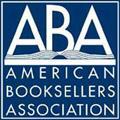 Through last fall, it seemed independent bookselling couldn't be more inspiring and exciting. Among the measures of growth over the past seven years: more and more indies have opened; the sales at most indies have increased; stores on the market find buyers; numerous established stores have opened branches; and, perhaps most heartening, more younger people are becoming booksellers and even founding bookstores, and they usually bring an impressive level of business, retail and technical sophistication and experience.
Through last fall, it seemed independent bookselling couldn't be more inspiring and exciting. Among the measures of growth over the past seven years: more and more indies have opened; the sales at most indies have increased; stores on the market find buyers; numerous established stores have opened branches; and, perhaps most heartening, more younger people are becoming booksellers and even founding bookstores, and they usually bring an impressive level of business, retail and technical sophistication and experience.
But since the November election, many indie bookstores have made a renewed commitment to values that they hadn't considered in such depth in a while, and are working to find ways to be even more valuable to the culture, to the exchange of ideas and to the concept of free speech--and to provide a gathering place and be a refuge.
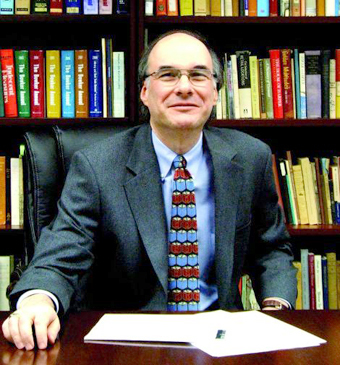 |
| Oren Teicher |
The topic came to the fore at Winter Institute 2017 in January, and as Oren Teicher, CEO of the American Booksellers Association, said in a recent interview, those discussions at Wi12 are reflected in the ABA's programming for the upcoming Spring Forums at the spring regional booksellers association meetings, beginning with the SIBA meeting next week in Atlanta, Ga.
As reported in Bookselling This Week, the interactive programming, called Bookstores--An Inclusive Place for Dialogue and Discovery, will focus on "strategies for strengthening the unique role that bookstores play in their communities" and will be be led by an ABA board member. In large and small groups, participants will "share ideas and brainstorm about how they can foster communication and create opportunities for people of diverse backgrounds to express and respond to differing views in the welcoming setting of a bookstore."
Teicher commented: "I'm confident as ever--no matter how challenging the times may be--that indie bookstores can continue to be a welcoming space for all and that we have a critically important role to play in bringing people together. Obviously, what works in one store may--or may not--work in another. But we are determined to do whatever we can to share best practices."
Yesterday, in a letter to ABA members, he emphasized that the meetings will be inclusive and welcoming to all: "ABA member stores come from urban, suburban, small town, and rural areas, and they serve a very wide range of customers. And I know that all of us want every bookseller--no matter what kind of store they come from--to feel comfortable participating in these Spring Forum sessions, and in ABA as a whole.
"Though it's hardly surprising, as we saw at Wi12, while many members share a similar political outlook, ABA recognizes, too, that those views are not held by everyone. Just as the shelves of our bookstores hold a wide variety of thoughts and opinions, our association is stronger if we respect the full spectrum of views among member bookstores and work to encourage an environment where all feel they can speak up and voice their points of view."
That was especially evident at the Winter Institute's Town Hall meeting, where several young booksellers called for more diversity in bookselling in general, and the ABA in particular. The ABA responded quickly, establishing and appointing members to a diversity task force; expanding the Booksellers Advisory Council to increase diversity; and continuing to be transparent about board elections, explaining all procedures repeatedly and in great detail.
Noting that "younger and newer booksellers are energizing our business, raising all sorts of issues that need to be raised," Teicher welcomed the inflow of younger people into bookselling. "Ten years ago, if you looked out at people at an ABA meeting, 90% were of the same age, of an age," he said. "That's flipped 180 degrees, and it's so heartening." Those younger booksellers "are populating the community with new energy that works across the board."
Another heartening change: a decade ago, when store owners wanted to retire, many had to close their stores, and "it was almost irrelevant how profitable or unprofitable a business it was. That's also changed 180 degrees."
Old and New Models
One example of a dynamic independent bookstore is Parnassus Books, Nashville, Tenn., where this past December--as he does every holiday season at a different member store--Teicher worked temporarily. "They're doing everything right and cooking on all cylinders," Teicher said. Beyond owner Ann Patchett's place in the community, the store benefits from a "really smart group of booksellers," both new and veteran, as well as from its "really warm, engaging feel." Thanks to its addition of more space last year, Parnassus was able "to create the kind of inventory that works at Christmas because they had room for it." Parnassus, he continued, was representative of many ABA stores: "Some just hit it out of the park."
By contrast, the news from Barnes & Noble continues to be "concerning," he said. (See third quarter results, above.) "It would be awful for the retail book business if B&N went away or gets further diminished." He emphasized that so much of the infrastructure that publishers have put together for bookselling is "a function of the number of outlets." In addition, consumers discover books "on the shelves of B&N as much as they discover them at our member stores." If that exposure to browsing goes away, "that's not good."
Teicher called "the model of the 30,000-square-foot bookstore," which is the size of many B&Ns, "antiquated." For one thing, "when you can replenish inventory overnight, you don't need that space." (He called today's fast standards of replenishment "probably the single most important contributor to bookseller profitability over the last five years.") And using books as wallpaper isn't necessary or advisable anymore, particularly considering the rent and operating costs for a large store. "I would argue that a display of five copies of a book will sell more compared to even a display of 100," he emphasized. A "perfect size" for a bookstore is maybe 6,500 square feet, he said. "It's got to be big enough so that the consumer will have the perception that there's a shot the store has that book they want."
B&N continues to lose market share, "obviously to Amazon," whose continuing growth is "just massive." (One indication of the e-tailer's power: "Amazon has become generic for online shopping.") He compared B&N's problems with those of department store chains like Macy's and Sears over last few years, perhaps in part because they're not offering an experience that brings customers into stores or perhaps because they have a model that worked for many years but is "old and tired."
In contrast, he said, indies are "working really hard at being creative, innovative and figuring out how to adapt. We keep reinventing ourselves, doing something different and special and unique."
In fact, indies did well this past holiday season, gaining a little, even though it was a presidential election year, which tends to dampen fall and holiday sales, and, of course--and one that was more nerve-wracking than most.
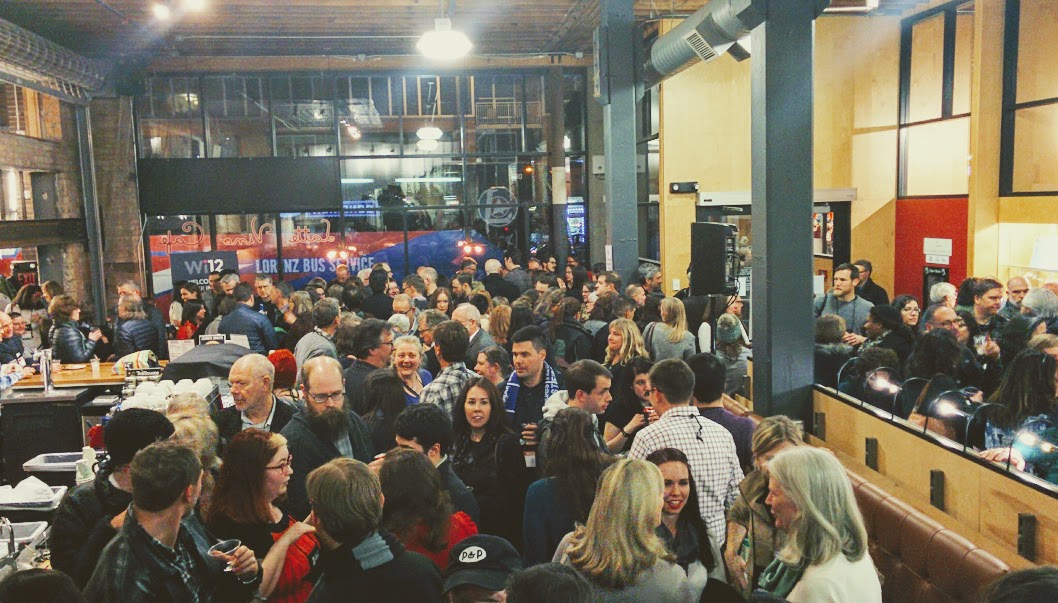 |
| The crowd at the opening reception at Wi12. |
Winter Institutes
Reflecting on the dozen Winter Institutes that have been held since 2006--which have become the preeminent booksellers event in the U.S.--he said, "Twelve years have gone by since the first one, and on one hand, it seems like yesterday. On the other hand, it seems like 300 years ago. So much is different and changed during the years, in the shape of our market and our reality." In January in Minneapolis attendees included 650 booksellers, a record, and more authors and publishers than ever. "The event has touched a nerve with our members and our publisher friends," he added. "It works."
Despite the Winter Institute's growth in size, it has retained its special cozy feel, thanks to the ABA's emphasis on "organizing it in a way that the bookseller experience is pretty comparable and we don't lose the sense of community we try to create," Teicher said. At the same time, the ABA tries to tweak things "so it's not exactly the same each time."
This year's Winter Institute benefited from the many first-timers--booksellers from new stores as well as many from stores that are usually represented but which have made efforts to send staffers who've never attended.
There remain a range of challenges for indie booksellers, Teicher noted. Beyond B&N's weak position and the growth of Amazon, there are "issues with increased rents and increased payrolls," related to the $15-an-hour minimum wage movement. "We have to be realistic," he commented. "Bookselling is not easy and has never been easy. There are some significant landmines about managing the future."
Still, Teicher said, "This is the most entrepreneurial, passionate group of people with the ability to reinvent themselves and make midcourse corrections. The willingness of stores to adapt and change, more than any other thing, has been the ingredient that has allowed them to grow and thrive."
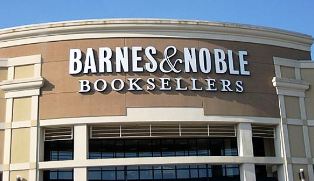 At Barnes & Noble, total sales in the third quarter ended January 28 fell 8%, to $1.3 billion, and net earnings fell 12.5%, to $70.3 million. Revenues were $10 million higher than analysts' estimates, but earnings were lower than expected.
At Barnes & Noble, total sales in the third quarter ended January 28 fell 8%, to $1.3 billion, and net earnings fell 12.5%, to $70.3 million. Revenues were $10 million higher than analysts' estimates, but earnings were lower than expected.




IPC.0204.S3.INDIEPRESSMONTHCONTEST.gif)



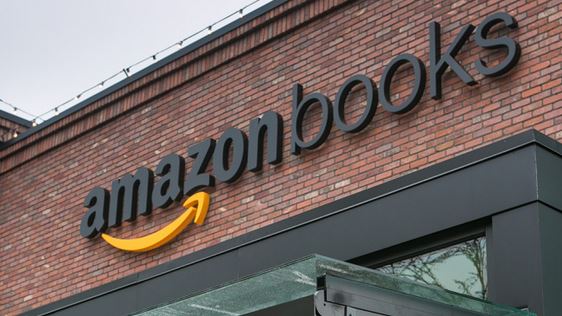 Without fanfare, Amazon has added coffee bars to the mix of books and electronics of at least two Amazon Books stores. WBUR reported that the Amazon Books that opened in Dedham, Mass., on Tuesday has "
Without fanfare, Amazon has added coffee bars to the mix of books and electronics of at least two Amazon Books stores. WBUR reported that the Amazon Books that opened in Dedham, Mass., on Tuesday has "
 Through last fall, it seemed independent bookselling couldn't be more inspiring and exciting. Among the measures of growth over the past seven years: more and more indies have opened; the sales at most indies have increased; stores on the market find buyers; numerous established stores have opened branches; and, perhaps most heartening, more younger people are becoming booksellers and even founding bookstores, and they usually bring an impressive level of business, retail and technical sophistication and experience.
Through last fall, it seemed independent bookselling couldn't be more inspiring and exciting. Among the measures of growth over the past seven years: more and more indies have opened; the sales at most indies have increased; stores on the market find buyers; numerous established stores have opened branches; and, perhaps most heartening, more younger people are becoming booksellers and even founding bookstores, and they usually bring an impressive level of business, retail and technical sophistication and experience.

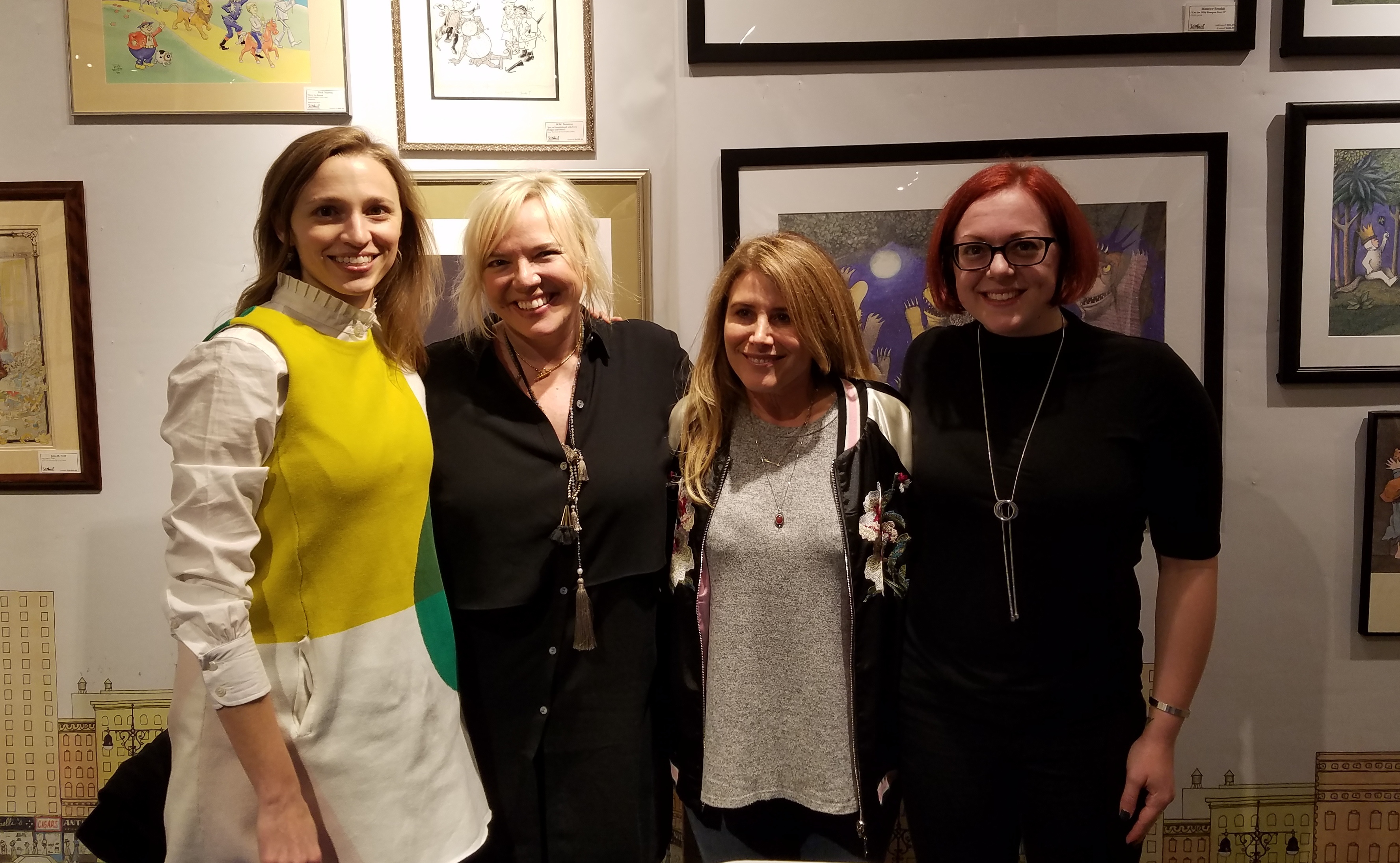
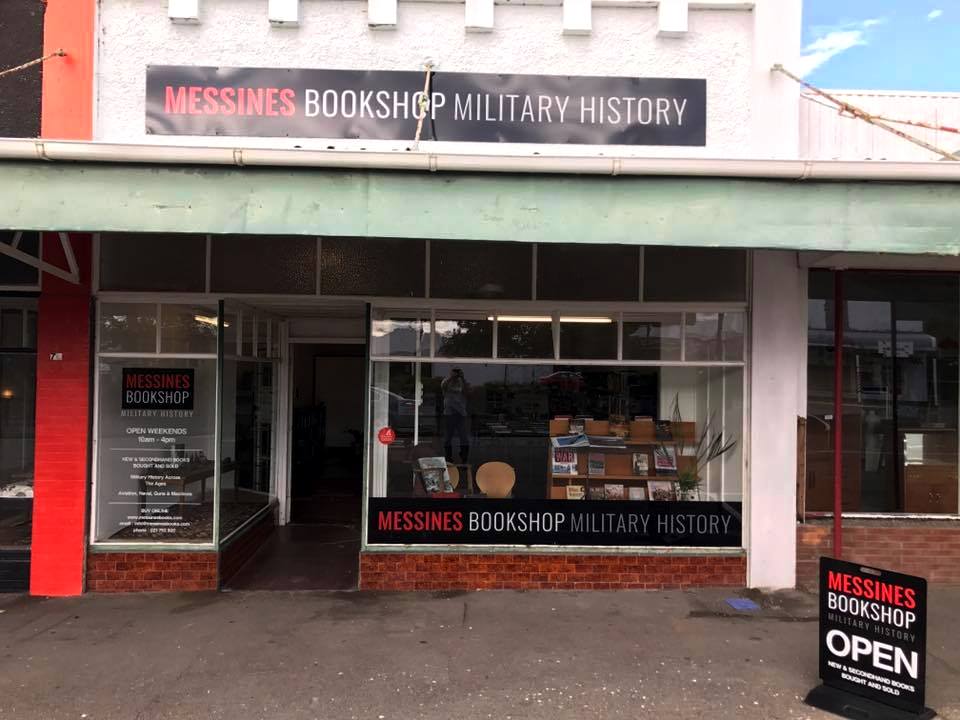 Gould: "As Chair of the Featherston Booktown Trust, I wanted to put my money where my mouth is and open a bookshop. There's a lot going on in Featherston bookselling, by April we'll have four bookshops in the town plus three shops that also sell books.... My shop's only been open for four weekends so far but already I've found selling books to be really great fun.... It's also interesting having been at Booksellers NZ for nearly eight years, to now experience actual bookselling for the first time. I have a huge amount to learn, and I'm grateful that experienced booksellers are being very generous with their assistance."
Gould: "As Chair of the Featherston Booktown Trust, I wanted to put my money where my mouth is and open a bookshop. There's a lot going on in Featherston bookselling, by April we'll have four bookshops in the town plus three shops that also sell books.... My shop's only been open for four weekends so far but already I've found selling books to be really great fun.... It's also interesting having been at Booksellers NZ for nearly eight years, to now experience actual bookselling for the first time. I have a huge amount to learn, and I'm grateful that experienced booksellers are being very generous with their assistance." The Spark and the Grind: Ignite the Power of Disciplined Creativity
The Spark and the Grind: Ignite the Power of Disciplined Creativity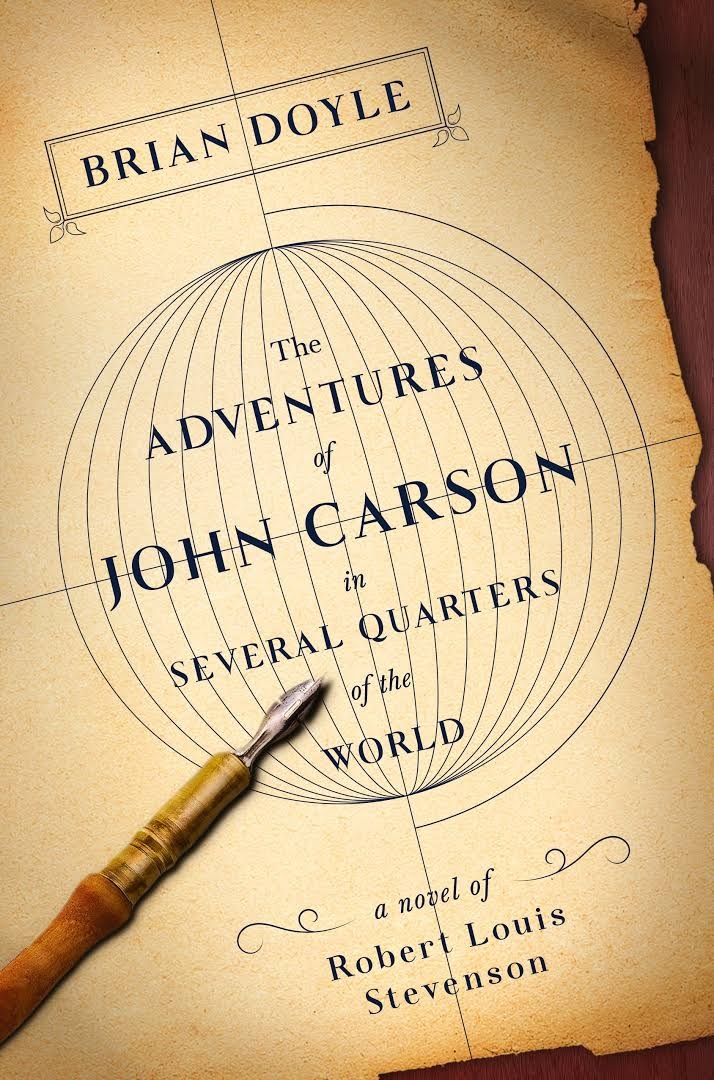 In a novel with layers of authors, Brian Doyle (
In a novel with layers of authors, Brian Doyle (